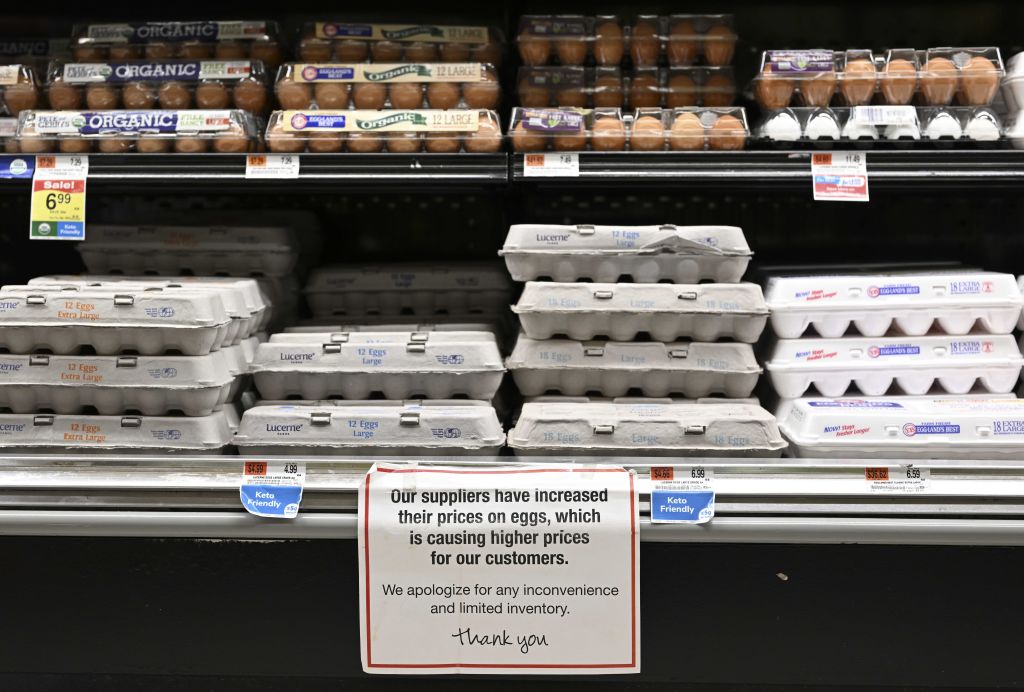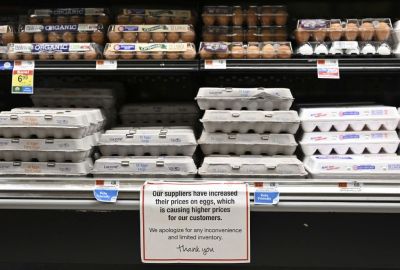Paying $7 for a dozen eggs pushed JoJo Dodd over the edge. The 30-year-old Californian recently bought three hens on Craigslist. Sharing a cramped backyard with Dodd’s dog, the trio of chickens now produce about an egg a day each, saving Dodd some $50 per month, minus the cost of feed.
In December 2021, consumers paid an average of $1.78 for a dozen eggs. A year later, the average price reached $4.25—a whopping 138 percent increase from the year prior, according to the Bureau of Labor Statistics. In some parts of the country, 12 eggs cost as much as $9.73, according to grocery delivery company Instacart.
What’s behind the sticker shock?
The bird flu
Part of the price increase is due to a viral disease sweeping across the United States, Africa, Europe, and parts of Asia: avian influenza, also known as bird flu.
The virus spreads easily in communities by direct contact, and it often lingers in an infected environment. Infection can be tricky to spot because hosts sometimes carry the virus without showing symptoms.
The latest outbreak, which began in February 2022, has become the country’s deadliest: It’s killed more than 58 million birds, out of an estimated 518 million chickens in the U.S.
Egg production dipped accordingly: Over 43 million of the chickens killed by bird flu have been table-egg laying hens, the U.S. Department of Agriculture (USDA) found. Accordingly, the table-egg production rate decreased by over 5 percent from November 2021 to November 2022. And the number of hens producing the eggs is down to 308 million after falling nearly 6 percent from 2021 to 2022.
The life cycle of egg-layers
It takes time for the egg industry to recover from such outbreaks, which have cascading effects on the hen population. When a single infected bird is introduced into a large commercial flock, thousands will be culled.
“Those animals that were killed basically were not scheduled for replacement,” Gino Lorenzoni, a professor of poultry science and avian health at Penn State’s College of Agricultural Sciences, said. “Rearing all those extra breeders [the mothers of the laying hens] for generating those commercial layers is going to take quite a bit of time.”
Baby chicks take at least 18 weeks to mature and start laying eggs. A healthy hen will produce eggs for about 70 weeks, and egg farmers work with breeders to factor in that timeline when planning replacements, Lorenzoni explained.
Public health protocols also delay the reintroduction of new birds to facilities where hens were infected. “Once depopulated facilities are cleaned and virus-free those facilities will be repopulated, but this takes 20-plus weeks,” Mike Persia, a professor of poultry sciences at Virginia Tech, said.
Inflation
Persia noted that supply chain issues, including an increase in fuel prices and increased input costs (such as the price of feed), only make the problem worse.
Of all food products on the consumer price index—beef, pork, poultry, eggs, and dairy—eggs had the highest inflation rate in 2022 compared with the year prior, according to the U.S. Department of Agriculture.
The high prices have spawned a slew of internet memes with plenty of anecdotal evidence about consumers seeking thrifty solutions.
Debb Thornton, of Harris County, Georgia, has owned chickens for around eight years. She’s seen more people asking a local Facebook farming group for chickens for sale. A few years ago, a fully grown hen cost $5-$10. Now they cost $30. “That’s a little greedy,” she said. “I don’t think anybody’s really going to do it, except the newbies that’s coming in that are panicking.”
Are producers price-gouging?
Egg prices have also raised some accusations about corporate greed.
U.S. Sen. Jack Reed on Tuesday asked the Federal Trade Commission to investigate whether there is “collusive pricing” by top egg producers.
The move comes after a farm group, Farm Action, last week called for the FTC to investigate whether some companies are guilty of price gouging. “The increase in the price of eggs has not been an ‘Act of God’—it has been simple profiteering,” the group claimed in a letter.
The group took aim at the number one egg company, the Jackson, Mississippi-based Cal-Maine Foods, which produces approximately a quarter of the eggs sold in America. Cal-Maine, Reed noted, reported profits of $323 million in the most recent quarter, compared to the same quarter last year when it recorded a net loss of over $16 million.
The company, meanwhile, admitted the record profits in a December earnings report, but has contended that “farm production costs per dozen increased 22.0 percent,” compared with the previous year, primarily due to the rising cost of feed. In 2020 a Texas court dismissed a previous price-gouging complaint against the company.
In addition to citing the impact of the avian flu, Cal-Maine in a statement Tuesday said that the prices customers see on shelves are a result of wholesale negotiations with retailers: Grocery store chains, companies servicing independent supermarkets, food service distributors, and other egg product buyers.
The egg industry, agricultural economist Damian Mason said, is one that historically operates within very tight margins but “right now is f---ing killing it.”
For now, more Americans may end up like JoJo Dodd, the Californian who bought his own chickens to avoid paying so much for eggs at the grocery store. “The idea of paying $7 or more for a dozen eggs just makes people angry,” he said. “Angry enough to buy chickens.”






Please note that we at The Dispatch hold ourselves, our work, and our commenters to a higher standard than other places on the internet. We welcome comments that foster genuine debate or discussion—including comments critical of us or our work—but responses that include ad hominem attacks on fellow Dispatch members or are intended to stoke fear and anger may be moderated.
With your membership, you only have the ability to comment on The Morning Dispatch articles. Consider upgrading to join the conversation everywhere.